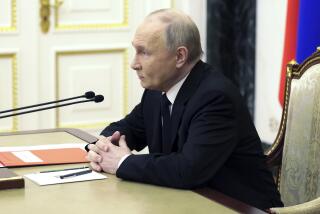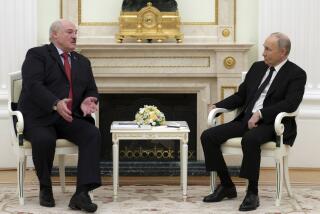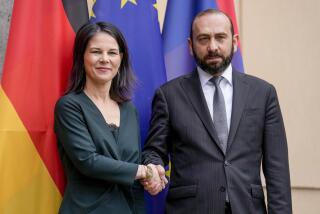Wants Conventional Arms Pact, Moscow Says
- Share via
GENEVA — Soviet Foreign Minister Eduard A. Shevardnadze declared here Wednesday that a conventional arms treaty in Vienna is a “first priority” for his country.
After a hastily arranged meeting with West German Foreign Minister Hans-Dietrich Genscher at the Soviet mission here, Shevardnadze sought to dispel the developing Western consensus that Moscow has slowed the pace of the arms talks in Vienna.
He said that he wants “accelerated” negotiations in Vienna at the conventional forces in Europe talks (CFE), which seek to reduce tanks, artillery, aircraft and troops in Central Europe.
And he suggested that agreement could be reached by the end of the year, contradicting U.S. Secretary of State James A. Baker III and other U.S. officials who have indicated doubt in the last week that such a timetable can be met.
“You don’t have to make concessions,” said Shevardnadze of the talks. “You have to make compromises.”
He stressed that negotiators have the opportunity “to accelerate the pace of the talks” but he admitted they “don’t have much time” to meet the year-end deadline.
Shevardnadze said Moscow is still in favor of a summit meeting of the 35-nation Conference on Security and Cooperation in Europe before the end of the year. The purpose of such a summit would be to ratify a treaty on conventional arms.
At the impromptu news conference at the Soviet mission, Shevardnadze was asked about the truth of reports that Baker was told in Moscow last week that the Kremlin insists on a limit to the size of the German army before unification.
“Nyet, “ he responded.
“That’s the first time Shevardnadze has said no,” said Genscher, smiling.
The two foreign ministers said they had discussed a wide range of issues, including German unification.
Genscher is determined, aides said, to mute Moscow’s opposition to a united Germany remaining in the North Atlantic Treaty Organization. When asked about German membership in NATO, Shevardnadze replied that it is a “tricky issue” that cannot be quickly resolved. But he did not reject the concept outright, as he and Soviet President Mikhail S. Gorbachev have done on other occasions.
Among the other topics discussed were economic, scientific and technological matters, the two men said. This left observers here with the impression that Genscher had offered the Soviet Union economic assistance to keep Moscow from holding up unification in the “two plus four” talks among the two Germanys, the United States, Britain, France and the Soviet Union.
Genscher has been in the lead among Western leaders in trying to reassure Moscow that a united Germany in NATO poses no threat to the Soviet Union and could assist Moscow’s efforts toward economic recovery.
More to Read
Sign up for Essential California
The most important California stories and recommendations in your inbox every morning.
You may occasionally receive promotional content from the Los Angeles Times.













